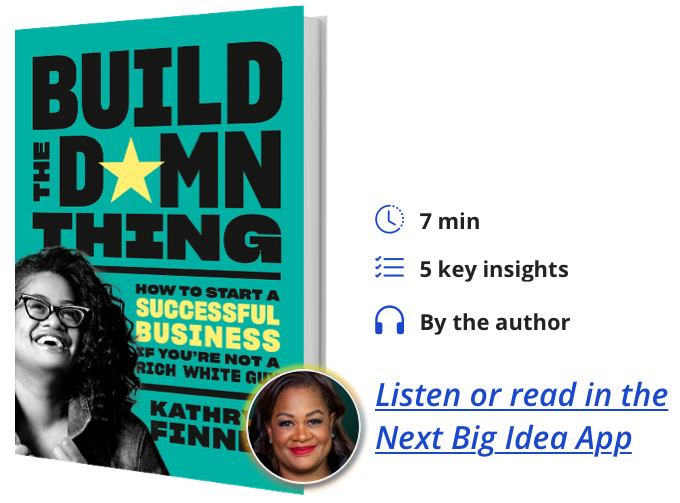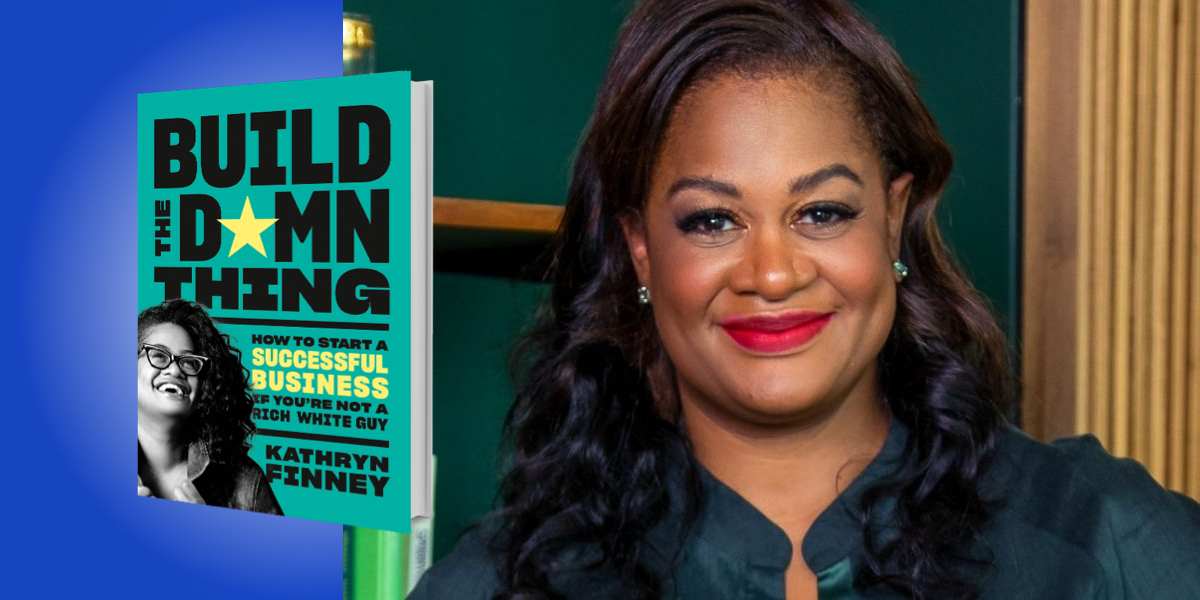Kathryn Finney is managing general partner at Genius Guild, a venture studio that invests in startups led by Black founders. Prior to this, she founded digitalundivided, a company which guides Black and Latina women through their entrepreneurial and startup journeys.
Below, Kathryn shares 5 key insights from her new book, Build the Damn Thing: How to Start a Successful Business If You’re Not a Rich White Guy. Listen to the audio version—read by Kathryn herself—in the Next Big Idea App.

1. Build your internal foundation.
It’s helpful to think of entrepreneurship as a video game where everyone starts on a different level. The goal of the game is growing your company and, on the surface, the rules seem fair. But not everyone has the same chance of winning because some gamers start on the easy levels and are given thicker armor, special weapons, and unlimited ammo. These people are the “Entitleds.” Others are forced to start on an advanced level with no armor, no special weapons, and no extra lives. I call them the “Builders.”
The path to success starts internally. To build a successful company, a leader must be comfortable with uncertainty, risk, and the challenges that come from building a startup. Companies that succeed have founders that build a strong internal foundation before executing their ideas.
As a Builder, you are the head of your company. If you’re not good, then the company will not be good either. It doesn’t matter that you’ve invented a way to make your cat’s litter box smell like cinnamon donuts or that you have so much money that your bank has its own bank. Taking time to mentally prepare for the daunting task of building a company will give a bigger return on your investment than jumping in.
“Companies that succeed have founders that build a strong internal foundation before executing their ideas.”
2. Name your price.
At his October 2011 appearance on Inside the Actors Studio, the sometimes-very-problematic comedian Dave Chappelle recounted a conversation he had with his father in 1991, when he graduated from Duke Ellington School of the Arts with plans to pursue comedy instead of attend college. His dad said, “Name your price in the beginning. If it ever gets more expensive than the price you name—get outta there.”
Fast-forward to 2004, when Dave signed a $50 million deal for a third and fourth season of Chappelle’s Show on Comedy Central. But feeling very uncomfortable with the deal, he walked away from all of that—and went to South Africa.
As a Builder, you will face a slew of challenges, from your bank account, personal life, and even mental health. So, it’s important to be clear before you start building your company about the line you will not cross. Naming your price (meaning, recognizing your core values) and defining what constitutes a violation, is crucial.
3. Know when to pivot.
When things aren’t working, Builders should know when to shift their strategy and try something new. Those with a fixed mindset won’t be able to envision a new path through the forest and carve the way ahead. When something isn’t working, don’t give up. Pivot to something new.
“When something isn’t working, don’t give up. Pivot to something new.”
4. Build a personal advisory board.
A personal advisory board should be comprised of people who want to see you win (not just your company) and they should feel comfortable being honest with you. While a few close friends or family members might be a part of this informal board, the people closest to us often find it difficult to tell us what we need to hear in difficult situations.
Some roles your board of advisors can play for you:
- BS Meter: this person is able to assess when you are being dishonest with them, and dishonest with yourself.
- Motivator: someone in your corner who will give you little pushes to keep moving forward, because building the damn thing is hard. There will be times when you want to throw in the towel, laptop, and adjustable desk to reclaim your free time (remember that?).
- Listener: There will be times on your entrepreneurial journey when you need to vent, so having a good listener is important. Unlike your BS Meter and Motivator, your Listener isn’t there to point out your delusions or pump you up. Their job is to empathize and say you’re doing a great job. This person pats you on the back or gives a hug.
“The people closest to us often find it difficult to tell us what we need to hear in difficult situations.”
5. Solve a problem.
Businesses, whether it’s your corner shop or cloud server provider, solve problems. If your idea doesn’t solve a problem that most people are willing to pay a premium for you to solve, then it isn’t a business, it’s a hobby.
You find out whether or not your business solves a problem by first defining the pain point, then finding the scale of the problem. Next, figure out whether people will pay for the solution, and then determine if it is a repeatable solution.
Builders build businesses because we want a creative life that we control. Entrepreneurship is the tool that helps achieve this goal.
The possibility of creating a legacy is so great that we choose to leave the gravitational pull of a traditional career to become entrepreneurs instead. Imagine creating something you truly believe in, watching it succeed beyond your wildest dreams, and then getting paid for the value you’ve created. That’s the promise of building your own damn thing.
To listen to the audio version read by author Kathryn Finney, download the Next Big Idea App today:
































